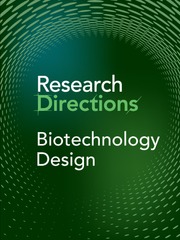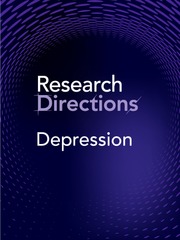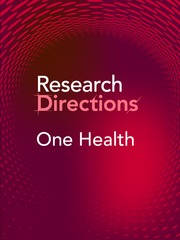Collection journals

Research Directions: Biotechnology Design
Editor-in-Chief: Professor Martyn Dade-Robertson, Northumbria University | UK
Biotechnology Design is a question driven, cross-disciplinary, modular and iterative research field. Characteristics that are hampered by traditional publishing, as researchers want to explore speculative, not yet perfected models and use tools and collaborators from fields they may not be familiar with and may not traditionally work with. These researchers need a forum where biologists, engineers, AI experts and designers can come together and experiment to find the solutions that the 21st century requires -be that to find answers for food production, to build materials (for clothing, housing, everyday objects), to facilitate travel or to address health issues. Research Directions: Biotechnology Design is a fantastic opportunity to push the boundaries of research in the area to ensure smarter, more sophisticated solutions to intrinsically difficult research questions and challenges.
View journal Research Directions: Biotechnology Design
Research Directions: Cyber-Physical Systems
Editor-in-Chief: Professor Jim Woodcock, Southwest University | China
Research Directions: Cyber-Physical Systems will have ceased publication at the end of 2025, and new submissions to the journal are no longer being accepted. All published materials will remain available through the Cambridge University Press platform in perpetuity.
Cyber-Physical Systems (CPS) integrate embedded computers and networks with physical processes. They depend on feedback loops between computation and physical processes, data analytics, and AI. Their engineering needs unprecedented cooperation between different engineering disciplines. Development and deployment require new integrated scientific theories and engineering techniques. They will deliver advances in green buildings, autonomous vehicles, traffic flow management, emergency response, smart grids, industrial control, personalised healthcare, robotics, and other areas only now being envisaged.
Research Directions: CPS will unite researchers from different fields. We will explore fundamental questions about the theory and practice crossing all traditional engineering disciplines. Research Directions will follow the research lifecycle and share ideas as these questions develop. We will use a rigorous peer-review process and provide an alternative, ideally faster, way to disseminate timely and innovative results that the community agree are essential for progress. The scope of the research questions, challenges, and hypotheses are: applications; design methods; design technology; high integrity CPS; implementation; systems; technology; theory; verification & validation.
View journal Research Directions: Cyber-Physical Systems
Research Directions: Depression
Editor-in-Chief: Professor Ian Hickie, University of Sydney | Australia
Research Directions: Depression will have ceased publication at the end of 2025, and new submissions to the journal are no longer being accepted. All published materials will remain available through the Cambridge University Press platform in perpetuity.
Research Directions: Depression aims to bring new insights to international attention, promote new methods and tools that can underpin rapid advances and draw attention to data that challenge existing biomedical, psychological and social orthodoxies. We encourage the active and timely sharing of novel research findings from many disciplines. We wish to resolve critical uncertainties in this most compelling and socially relevant field. The focus is on what new or existing information is required to solve pressing problems and answer the central questions. The journal invites authors to answer the questions that matter most to those who are most affected. Authors can contribute with Results, Analysis, Impact papers, datasets, presentations, grant proposals, methods papers and much more to this journal and its companion community site.
View journal Research Directions: Depression
Research Directions: Mine closure and transitions
Co-Editors-in-Chief: Professor Thomas Baumgartl, Federation University | Australia and Professor Guy Boggs, University of Western Australia | Australia
Research Directions: Mine Closure and Transitions will have ceased publication at the end of 2025, and new submissions to the journal are no longer being accepted. All published materials will remain available through the Cambridge University Press platform in perpetuity.
Research Directions: Mine Closure & Transitions aims to investigate the ways in which mines are closed such that they deliver environmental, social, cultural and economic value. This will include examination of how closed mine sites and related assets can be repurposed, and how to enable Just Transitions for mining regions and communities through closure. The journal provides a vehicle for bringing new insights to international attention, promote new methods and tools that can underpin more rapid advances, draw attention to data that challenges existing orthodoxies and encourage the sharing of novel research findings from many disciplines that are most relevant to resolving critical uncertainties. With growing societal and investor expectations, and decarbonisation driving transitions across the globe, its critical that we focus on what information is required to answer the most pressing questions that matter most to those most affected. The journal will connect academia and industry, providing rapid access to research findings regarding applied, scientifically complex problems to meet societal expectations and demands and help the mining industry contribute to achieving the sustainable development goals.
View journal Research Directions: Mine closure and transitions
Research Directions: One Health
Editor-in-Chief: Professor Richard Kock, Royal Veterinary College | UK
Research Directions: One Health will have ceased publication at the end of 2025, and new submissions to the journal are no longer being accepted. All published materials will remain available through the Cambridge University Press platform in perpetuity.
One Health is a collaborative, multisectoral, and transdisciplinary approach—working at the local, regional, national, and global levels—with the goal of achieving optimal health outcomes recognizing the interconnection between people, animals, plants, and their shared environment. One Health is an emerging paradigm seeking to engage interdisciplinary science with research scientists and professionals across society. Research Directions: One Health focuses on interdisciplinary outputs that employ a One Health approach at the interface between humans, animals and their environment, such as disease prevention, surveillance and management (i.e., preparedness and response). Core disciplines include health-specific such as medicine, veterinary medicine, pathobiology, epidemiology, and disease ecology. In addition, allied disciplinary areas such as ecology, mathematical modelling, toxicology, systems thinking, political ecology and economics are interrogated for results and innovative solutions to health problems.
View journal Research Directions: One Health
Research Directions: Quantum Technologies
Editor-in-Chief: Dr. Daniel Oi, University of Strathclyde | UK
Research Directions: Quantum Technologies will have ceased publication at the end of 2025, and new submissions to the journal are no longer being accepted. All published materials will remain available through the Cambridge University Press platform in perpetuity.
Quantum technologies takes advantage of quantum effects, such as quantum entanglement and superposition, to enhance the performance of existing applications or enable new capabilities. By exploiting quantum behaviour of photons, electrons, atoms, and condensed matter, they have the potential to: deliver increased information processing power; secure communications; achieve high-precision positioning, navigation, and timing; greatly improve sensing and detection; and revolutionize sectors such as information technology, health, defence, manufacturing, and transport.
To overcome tremendous challenges in implementation and fulfil its potential, scientists, engineers, and leaders in industry need to come together to find the right solutions to make Quantum technologies a reality. The Research Directions: Quantum Technologies journal supports researchers throughout the entire innovation process and fosters truly multidisciplinary collaboration to advance this field.
View journal Research Directions: Quantum Technologies
Research Directions: Sleep Psychology
Editor-in-Chief: Associate Professor Daniel Kay, Brigham Young University | USA
Research Directions: Sleep Psychology will have ceased publication at the end of 2025, and new submissions to the journal are no longer being accepted. All published materials will remain available through the Cambridge University Press platform in perpetuity.
Research Directions: Sleep Psychology is the premier journal for psychologists and sleep researchers whose work aims to answer critical theoretical, methodological, and application-level questions related to the psychology of sleep, dreams, and biological rhythms. Sleep psychology is an emerging, interdisciplinary field dedicated to examining the psychological nature, functions, and mechanisms of sleep, as well as the various psychological factors influenced by sleep, such as emotions, thoughts, behaviours, and mental disorders. The journal will publish questions on topics such as, sleep mentation, the impact of sleep on cognitive, behavioural, and psychosocial functioning, memory consolidation during sleep, the role of sleep in emotional regulation, the relationship between sleep and mental health, psychological aspects of sleep disorders, psychological dimensions of sleep health, and the use of psychological interventions to improve sleep and circadian rhythms. Authors are invited to submit all research outputs including results, analysis, impact papers, datasets, presentations, grant proposals, and much more to this journal and its companion community site.
View journal Research Directions: Sleep Psychology